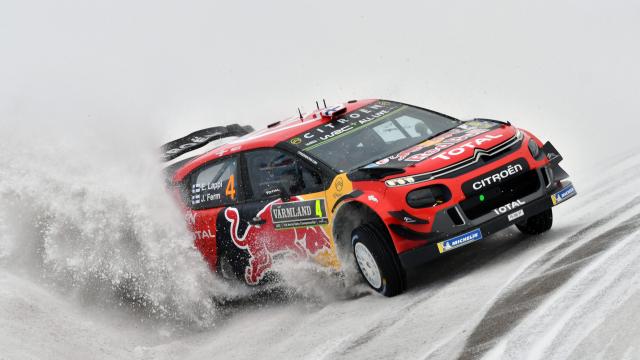Rally Sweden, with its treacherous snow-packed roadways and unique winter conditions, has been a longstanding gem in the World Rally Championship calendar. But the fate of this month’s February 13-16 event is currently hanging in the balance because there’s just not enough snow.
Much of northern Europe has been hit with unseasonably warm temperatures this year, with The Local Sweden predicting that this might just be the warmest winter ever recorded—exceeding even last year’s record-breaking temperatures. Here’s the global increase of recorded temperatures shared by NASA:
While there’s a very obvious exponential increase in global temperatures over the past three decades, Sweden is subject to even greater fluctuations in temperature due to its proximity to the Arctic Circle. Here’s more on why:
The reason that Sweden’s temperature increase is outpacing the rest of the Earth is its proximity to the Arctic. As the Arctic ice retreats, Sweden gets warmer.
“The ice is cold and lies like a cover over the sea’s surface. Just a bit of warming can cause the ice to melt, which in turn leads to the water heating up the air further,” [climate scientist at the Swedish Meteorological and Hydrological Institute Gustav] Strandberg said.
One result of the rising temperatures in Sweden will be “fewer white winters in the future,” Strandberg said.
As a result of the process of melting and heating, the traditional thick layer of snow that Rally Sweden is known for hasn’t accumulated. Some snow has fallen, yes. But it hasn’t been cold enough for that snow to build up into a formidable racing surface. The Rally Sweden Historic event, which takes place during the same weekend as the WRC event, has already been cancelled, but The Powers That Be are hoping for something of a miracle to save Rally Sweden.
Rally Sweden CEO Glenn Olsson has been quoted in Autosport with the following:
Snow has fallen in the rally region in recent days. But the unseasonably warm weather and current weather forecasts continue to provide concerns as to the suitability of the roads in the special stages to allow the event to go ahead as planned.
Further alignment with the manufacturer teams will take place and the FIA will conduct an onsite inspection of the stages at the beginning of this week.
We continue to examine every possible way to ensure the rally goes ahead.
The conditions are being monitored constantly and the situation will be re-evaluated with any decisions required to be made this week.
A decision was expected yesterday, February 3. But conditions weren’t great, so rally officials have provided an extension in the hope that a sudden snowfall—or a shortening of the stages—will allow the race to go ahead.
Rally Sweden has only been cancelled one other time as a result of weather, according to the event’s website. In 1990, the weather was also too mild to accrue enough snow to race on.
But if this year’s Rally Sweden is cancelled, it would also mean that two of the last three WRC events have not gone ahead due to climate issues. Rally Australia, the final event of the 2019 season, did not go ahead due to severe bushfires affecting the area—fires that are still raging months down the line. And those bushfires are also linked to the impact of climate change. From Time:
The Australian bushfires were exacerbated by two factors that have a “well-established” link to climate change: heat and dry conditions, says Stefan Rahmstorf, department head at the Potsdam Institute for Climate Impact Research in Germany and a lead author of the United Nations’ Intergovernmental Panel on Climate Change’s Fourth Assessment Report.
[…]
“Due to enhanced evaporation in warmer temperatures, the vegetation and the soils dry out more quickly,” says Rahmstorf. “So even if the rainfall didn’t change, just the warming in itself would already cause a drying of vegetation and therefore increased fire risk.”
These are massive shifts in the very composition of our planet, backed up by research NASA has done and collected from countless international agencies, governments, and and scientific societies:
The potential future effects of global climate change include more frequent wildfires, longer periods of drought in some regions and an increase in the number, duration and intensity of tropical storms
[…]
Effects that scientists had predicted in the past would result from global climate change are now occurring: loss of sea ice, accelerated sea level rise and longer, more intense heat waves.
To put it quite simply, two WRC events within the span of four months have been threatened by specific, measurable increases in our planet’s average temperature.
It can be easy to live in an insular bubble, ignoring the impacts that climate change is having on the planet, but in situations like these, we’re really forced to come face-to-face with the reality of the world we’re living in. Events like Rally Sweden take place at this specific, traditional time of the year because we used to be able to guarantee things like a decent amount of snow in an Arctic Circle winter, or a warm-but-not-too-hot temperature at the start of an Australian summer. Having a climate-based event in 2020 is risky business.
Whether you like it or not, conversations about climate change are here to stay in motorsport. And when the very existence of fan-favourite historical events is threatened by it, it’s time to start paying attention.
